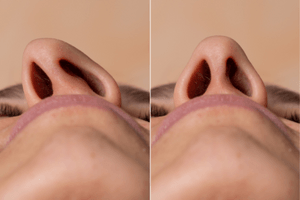If you’ve been diagnosed with a deviated septum, you are probably intimately familiar with how the condition can disrupt your life. This type of defect isn’t life-threatening, but it can cause acute or chronic discomfort, nasal congestion or complete obstruction, recurrent nosebleeds, facial pain, and/or recurrent sinus infections throughout your life. To stop these concerns from happening, you’ll need to know when it’s time to see an ENT doctor or nose & sinus specialist for a deviated septum.
What Is a Deviated Septum?
The nose is made of skin, bone, and cartilage. Inside the nose, separating the left nostril from the right, is a thin and rigid structure made of cartilage and bone that runs from the front of the nose to the breathing airways in the back — the septum. Normally, the septum helps moisturize inhaled air and keep the nostrils separated. This is beneficial when infections like sinusitis or allergies strike that cause swelling and congestion in the nose. Instead of blocking the entire opening of the nose, the swollen and irritated tissues trigger congestion on one side of the nostril and septum.
What Are the Consequences of a Deviated Septum?
Contrary to common belief, no one has a perfectly straight nasal septum. The nasal septum have some degree of deviation. However, a deviated septum is an abnormal curvature or crookedness in the thin wall between the nostrils, making one side smaller or narrower than the other. When deviations or abnormalities are present in the septum, the central portion of the nose appears misaligned, crooked, and unbalanced with the facial features.
Although most people with a mildly deviated septum are unaware of their condition, others are not as fortunate. The misalignment in their nasal septum is often the source of the following symptoms.
Nosebleeds are a common side effect of having a crooked nasal septum. The deviation causes the skin in the nasal passages to dry out and become irritated, increasing the risk of nosebleeds.
Nasal or facial pain is common with a severely deviated septum. This is often because of pressure buildup in the sinuses due to congestion.
Congestion is a common symptom since one nasal passage is smaller than the other. This can be particularly distressing or uncomfortable when you are sick, causing severe congestion and sinus pressure.
Chronic or acute sinus infections cause nasal irritation, congestion, and inflammation, which can be extremely debilitating. In rare cases, sinus infections can become severe infections that spread and endanger the brain. Treatment is important.
Sleep apnea is a condition that causes multiple pauses in breathing while asleep. The symptoms include poor sleep quality, loud, noisy breathing, and waking up and gasping for air. This condition robs the brain and body of oxygen.
A deviated septum can cause severe or complete obstruction of the nostrils, making breathing through the nose incredibly difficult or downright impossible. It can also lead to significant health problems like diabetes and hypertension without treatment.
Deviated Septum Treatment
For most people, a deviated septum might not be severe enough to cause significant discomfort in their daily lives. However, you should seek treatment if you have a nasal obstruction on one or both sides of your nostrils that doesn’t respond to normal decongestants or self-correct after a few weeks.
Similarly, if you are experiencing chronic congestion, nosebleeds or recurrent sinus infections, it might warrant a doctor’s appointment. The right diagnosis and treatment can significantly improve your comfort and long-term health.
To diagnose a deviated septum, an ENT doctor will take note of your symptoms and conduct a physical examination. Depending on the severity of the deviation, you may be able to manage the symptoms with over-the-counter or prescription decongestants and antihistamines, as well as steroid nasal sprays. These medications help reduce congestion and swelling in your nasal passages to help you breathe easier.
Because a deviated septum is a defect in the anatomical structures of the nose, it is a lifelong condition if one does not get proper treatment. At times, the side effects are mild and not serious enough to warrant treatment. However, many people with a deviated septum in California eventually have surgery to repair the defect and improve their nose’s function.
Septoplasty for a Deviated Septum

For permanent relief, more invasive measures are necessary. Septoplasty is the standard for repairing crooked and defective nasal structures like a deviated septum to straighten the nasal wall and improve airflow.
Surgery is often reserved for those with severe symptoms. Because not everyone with a deviated septum requires advanced medical care or septoplasty, treatment recommendations are based on the symptom severity and the cause.
Ready to See an ENT Doctor in Los Angeles for Deviated Septum Care?
If you or someone you know has significant symptoms, it’s time to consider ENT care or surgery for permanent relief to avoid living with the discomfort of a deviated septum.
To ensure you get the best possible treatment, it is important to find a quality ENT doctor for your deviated septum surgery. If you are looking for top-tier ENT doctor for your deviated septum surgery in Los Angeles, contact world-renowned nose and sinus specialist, Dr. Alen Cohen, to make your initial consultation.
Contact the Southern California Sinus Institute today to make an appointment with Dr. Alen Cohen to discuss your symptoms and learn the best treatment options for your deviated septum.

